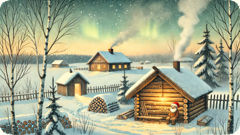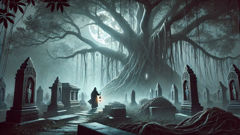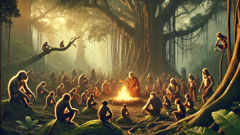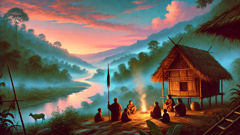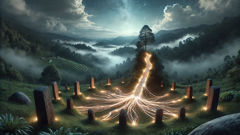Introduction
The first snows of winter blanketed the birch woods and fields, muffling the sounds of the world and turning the little village of Haukijärvi into a landscape of soft, pale blue shadows. Every home, from the grandest manor to the humblest croft, became an island of warmth, their windows glowing with the promise of stories, food, and laughter. In the heart of this village stood the Koskinen family’s homestead: a cluster of sturdy log buildings, ringed by stone fences, their thatched roofs hunched beneath the weight of new snow. Smoke curled from the chimney of the main house and, a little way off, from the sauna—a squat, mossy-roofed hut beside a frozen pond. All seemed peaceful, and yet, beneath this outward calm, something more ancient and mysterious stirred. For, like many homes across Finland, the Koskinen’s house was not watched over by its human inhabitants alone.
There lived here a Tonttu—a small, wise, and quietly powerful spirit who had guarded the family’s fortunes for generations. Few had ever glimpsed him, for he was a master of moving unseen: a figure no taller than a child, with a gray beard, clever eyes, and a red cap pulled low over his brow. The Tonttu’s presence was felt in the gentle creak of floorboards at night, in the faint footprints that appeared in flour dust by morning, and in the curious way that cows seemed to yield more milk or woodpiles lasted longer when all was well. He kept watch especially over the sauna, for he knew it was the heart of the home—a place where warmth and cleanliness intertwined, where stories were shared, and where generations sought solace from the darkness and cold.
To those who respected tradition, showed kindness to animals, and left a bowl of porridge on Christmas Eve, the Tonttu brought protection and small, steady miracles. But to those who grew careless, greedy, or disrespectful, he could be a stern reminder of forgotten wisdom. In the long, deep nights of the Finnish winter, when auroras shimmered above and wolves howled in distant woods, the presence of the Tonttu was both a comfort and a warning—a whisper that the old ways still mattered, and that unseen eyes watched over every hearth.
The Arrival of Winter and the Watchful Eyes of the Tonttu
The Koskinen family—Mikko, his wife Elina, their two sons Eero and Ville, and Mikko’s elderly mother Aila—welcomed winter as their ancestors had before them: with preparation, gratitude, and quiet respect for the old spirits said to dwell among their barns and byres. Each November, before the lakes froze solid and nights stretched impossibly long, Mikko would carry out the rituals his father had taught him. He would sweep the threshold with pine boughs, sprinkle a little salt at the door to ward off misfortune, and mutter a few words of thanks to the unseen Tonttu. No one dared take these customs lightly; they were woven into the fabric of daily life, even as the outside world marched slowly toward modernity.
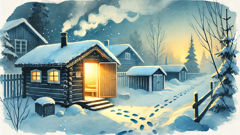
The Tonttu of the Koskinen homestead had watched over this family for more than a hundred years—longer than anyone could remember. Some said he’d once been seen by Aila herself when she was a little girl, darting across the yard on the night before Christmas, his beard frosted with snow. Others insisted he left tiny gifts—a perfectly polished stone, an egg with a double yolk, a sprig of juniper—on the sauna bench or in the hayloft. Aila would only smile when pressed, her eyes crinkling with secrets. “The Tonttu comes to those who believe,” she’d say. “He is as old as the forest, and as quick as a shadow.”
The heart of the home was the sauna. Every Saturday night, without fail, the family would gather there to wash away the week’s weariness and listen to Aila’s stories. The heat was a living thing—thick, fragrant with birch branches, hissing when water met stone. Here, troubles seemed smaller, and even the wildest winter wind was tamed. The Tonttu was especially attached to this little building. He kept it free of mischief, chased away sickness, and sometimes left messages in the steam that curled along the walls.
One December evening, as Mikko stacked wood by the door, he noticed something odd: a small set of footprints in the fresh snow, circling the sauna. They were too tiny for Eero or Ville, and besides, both boys were inside, their laughter muffled by thick walls. Mikko paused, heart pounding with a mix of awe and fear. He knelt, examining the prints—four toes, pointed, and the faint outline of a heel. His breath rose in clouds, and for a moment, he felt as if the whole world held its breath with him.
He didn’t mention what he’d seen to Elina or the boys, but that night, after everyone else had gone to bed, he crept outside with a bowl of fresh porridge. He placed it on the sauna’s threshold, murmured a word of thanks, and retreated. The next morning, the bowl was empty, cleaned so carefully that not a grain remained.
Winter deepened. The family’s cow gave birth to healthy twins—a rare blessing—and the hens laid more eggs than usual. The woodpile seemed never to shrink, even as the stove was fed day and night. Aila nodded knowingly at these small miracles. “The Tonttu is pleased,” she whispered to Eero as they gathered eggs. “He likes when we remember him.”
But not all was peaceful in Haukijärvi. In the neighboring farm, the Lehtinen family had suffered a run of bad luck—illness among the cattle, spoiled grain, and arguments that echoed into the night. Some whispered that their Tonttu had been offended or perhaps driven away by neglect. The old ways were fading, some said; the world was changing, and even the spirits seemed restless.
Yet in the Koskinen home, tradition held fast. When Christmas Eve approached, the family cleaned every corner, polished every pot, and left not only porridge but also a tiny cup of cloudberry liqueur by the sauna door. That night, as northern lights danced across the sky, Eero claimed he heard faint humming—like the song of an old man content with his work. Whether it was wind or something older, no one could say. But every member of the family went to bed with a sense of peace, certain that, just beyond sight, their Tonttu stood guard against the winter’s darkness.
The Threat to the Hearth: Greed and Forgetfulness
As winter pressed on, change crept into Haukijärvi with footsteps heavier than those of any Tonttu. Word arrived that a merchant from the city had set his sights on the village’s woodlands. He offered tempting prices for timber—more than any family had seen in years—and promised easy money for those willing to fell the oldest pines and birches. Some neighbors leapt at the chance, eager to modernize their lives and buy luxuries previously out of reach. Even Mikko felt the pull of such prosperity. With two growing sons and an aging mother to care for, the thought of new boots, extra flour, or a proper iron stove gnawed at him during long, sleepless nights.
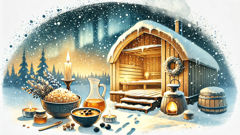
Elina saw his worry. “What good is gold if it costs us our roots?” she asked softly, her hands kneading bread at the kitchen table. “The forest gives us more than wood. Remember what Aila taught us.”
But temptation is stubborn. The merchant visited every home, carrying ledgers thick with promises. When he knocked at the Koskinen door, he found Mikko alone, mending a harness. The merchant’s words were smooth, his smile practiced. “With your share, you could build a new barn. Or send Eero to school in town. Times are changing, friend.”
Mikko hesitated. He glanced out the window toward the forest edge, where ancient trees stood dark and silent against the snow. “We’ll think on it,” he said.
That night, Mikko tossed and turned, images of gleaming coins and new tools warring with memories of his father’s voice: The forest is our shield and our friend. In his unrest, he forgot to leave the Tonttu his bowl of porridge—a lapse unnoticed until morning.
Strange things began to happen. The cows grew restless; their milk soured overnight. Chores took twice as long. The door to the sauna jammed, and a chill seemed to settle over the house, despite a roaring fire. Eero fell ill with a fever, muttering in his sleep of shadows moving in the rafters.
Aila, ever wise to the ways of old, noticed these signs at once. She drew Mikko aside. “You mustn’t forget the Tonttu,” she chided gently. “He protects us when we honor the past. If we anger him, we invite misfortune.”
Ashamed, Mikko hurried to prepare an offering: not just porridge, but honey, berries, and a sprig of juniper—gifts from heart and hand. He set them by the sauna door at dusk and whispered an apology into the icy air. For a moment, nothing happened. Then he caught a flicker of movement at the corner of his eye—a tiny figure in a red cap, vanishing behind a snow-laden log.
That night, Eero’s fever broke. The cows calmed, and the air in the house grew warm again. Mikko understood, at last, that some things were not for sale: the forest’s hush at dawn, the peace of a well-tended hearth, the invisible blessing of a Tonttu who watched over them all.
The merchant returned one last time, growing impatient with the Koskinen family’s reluctance. Mikko stood firm, Elina at his side. “We will not sell what cannot be bought,” he declared. “The forest is part of our home. The Tonttu will see we remember.”
Neighbors muttered and shook their heads, but Aila smiled. She knew that in resisting greed and honoring tradition, the Koskinens had chosen the path of wisdom—the same path their Tonttu had guarded for generations.
The Heart of the Sauna: The Tonttu’s Secret Gift
Spring arrived hesitantly, dripping from the eaves and coaxing green shoots through the melting snow. With it came renewal—a chance to mend what winter had tested. The Koskinen homestead breathed easier: cows grazed on fresh grass, hens clucked contentedly, and Eero raced with Ville through puddles and mud. Yet beneath this bustle, a sense of gratitude lingered for all that had been preserved.
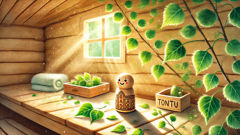
The sauna, battered but unbowed by months of cold, stood at the center of it all. It was here, as days lengthened and nights lost their edge, that the family gathered to mark the coming of summer. Aila led the way, her hands steady despite her years, her voice rich with old songs as she poured water onto the hot stones. Steam billowed, fragrant with birch and resin. In this heat, the worries of winter seemed to float away.
But something was different this year. Elina noticed it first: the stones glowed more brightly, and the steam seemed softer, wrapping around them like a gentle hand. When she placed her towel on the bench, she found a tiny carving—a wooden Tonttu, no larger than her thumb, its face merry and kind. She showed it to Mikko, who marveled at the craftsmanship.
“Perhaps our Tonttu has left us a sign,” he mused. “A thank you for remembering him.”
That night, as the family sat around their kitchen table, Aila told them a story she’d kept close for decades:
“Long ago,” she began, “when my own mother was young, she fell ill one bitter winter. My grandfather despaired, for no doctor could reach us through the snow. One night, as he sat beside the dying fire, he saw a flicker of movement—a Tonttu, small and gray-bearded, warming his hands by the embers. The Tonttu told him to heat stones in the sauna and wrap my mother in birch leaves. ‘The warmth will draw out her fever,’ he said. My grandfather obeyed, and by morning, my mother was well again.”
The children listened wide-eyed. “So the Tonttu saved our family?” Ville whispered.
Aila nodded. “He saved us because we cared for him—because we remembered our place in the circle of home and forest.”
From then on, the family made extra room for the spirit’s kindness. Each week, they left little tokens at the sauna: a piece of rye bread, a handful of berries, a wisp of wool. The sauna itself seemed to grow more welcoming—its benches warmer, its stones more resilient, its walls humming with unseen energy.
As years passed, the Koskinens flourished. Eero grew strong and clever, Ville quick and kind. The land yielded good harvests; storms passed them by. Neighbors began to notice their good fortune and asked about their secret. The family would only smile, pointing toward the sauna with a wink. Some dismissed it as superstition, but others began to restore their own traditions—offering porridge to their Tonttu, repairing barns with care, greeting dawn with quiet gratitude.
Through it all, the Koskinen Tonttu watched from his hiding place: beneath a root, behind a beam, or from the shadows where firelight met dusk. He saw his family’s wisdom echo outward—quiet as snowfall, enduring as stone. And on midsummer’s eve, when the sky never fully darkened and children danced beneath birch trees, he smiled beneath his red cap and knew his work was cherished.
Conclusion
The legend of the Tonttu lives on, whispered through generations that find meaning in quiet acts of gratitude and respect for home, hearth, and nature. In a world that often forgets its roots, the Tonttu reminds us that true wealth lies not in gold or fleeting comforts, but in traditions lovingly upheld and the wisdom quietly passed from parent to child. For every well-tended sauna and every thoughtful offering left at the threshold, there is a spirit watching—a silent guardian who rewards kindness with blessings both seen and unseen.
In the Koskinen homestead and beyond, the Tonttu’s lessons linger: cherish your home, honor what cannot be bought or sold, and remember that magic endures wherever there are those willing to believe. And so, whenever you pass by a glowing sauna on a winter’s night or notice tiny footprints in fresh snow, you might just sense the presence of Finland’s oldest and wisest protector—smiling quietly beneath his red cap, content that his legend will never fade.

